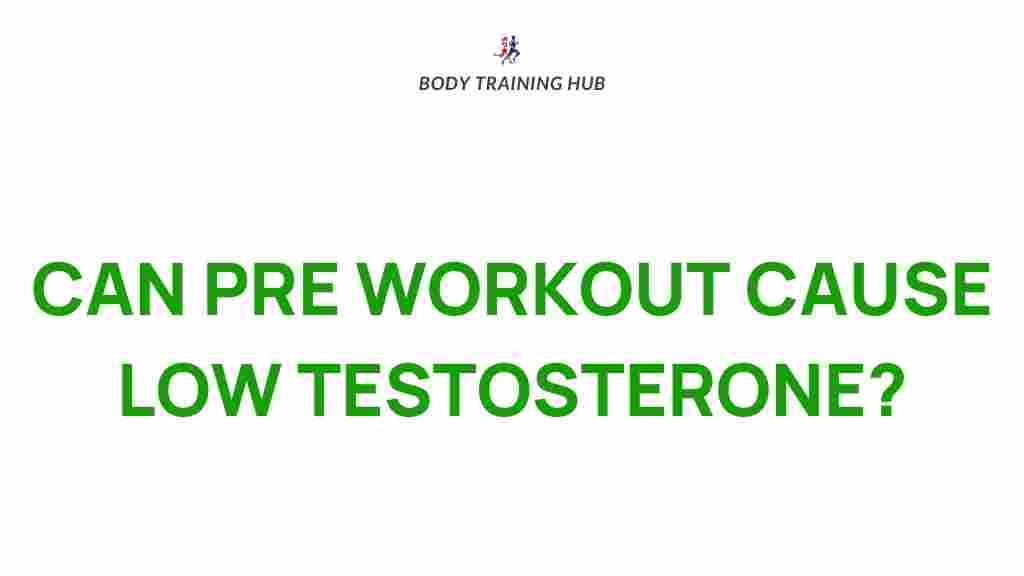In recent years, fitness enthusiasts and athletes have turned to pre-workout supplements for that extra edge in performance and endurance. However, questions often arise about how these supplements impact testosterone levels. Are they beneficial, harmful, or neutral? In this guide, we delve into the science behind pre-workout supplements and their connection to testosterone, helping you make informed decisions for your fitness journey.
The Role of Pre-Workout Supplements in Fitness
Pre-workout supplements, commonly referred to simply as pre-workout, are formulated to enhance athletic performance. Typically taken 15-30 minutes before exercise, these supplements contain a mix of ingredients such as caffeine, amino acids, and creatine. Their primary goal is to boost energy, improve focus, and support muscle endurance.
While many fitness enthusiasts swear by their effectiveness, concerns about their impact on hormones—especially testosterone—have emerged. Testosterone is a critical hormone for muscle growth, recovery, and overall vitality, making it essential to understand any potential effects pre-workouts may have.
Key Ingredients in Pre-Workout Supplements
- Caffeine: A powerful stimulant that enhances focus and energy.
- Creatine: Supports muscle strength and recovery.
- Beta-Alanine: Helps delay muscle fatigue during intense exercise.
- L-Citrulline: Promotes blood flow and reduces muscle soreness.
- B Vitamins: Essential for energy production.
While these ingredients target physical and mental performance, their influence on hormonal activity, including testosterone levels, varies. Let’s examine the connection between pre-workouts and testosterone in greater detail.
How Does Pre-Workout Affect Testosterone Levels?
Research on the effects of pre-workout supplements on testosterone is still evolving. However, studies suggest that the impact largely depends on the ingredients and the individual’s response to them. Here’s what we know:
Positive Effects
- Increased Physical Activity: Many pre-workout supplements enable more intense workouts. High-intensity exercise can naturally boost testosterone levels.
- Improved Blood Flow: Ingredients like L-citrulline enhance circulation, supporting nutrient delivery and potentially aiding testosterone production.
Potential Concerns
- Excessive Stimulants: Overuse of caffeine may lead to elevated cortisol levels, which can suppress testosterone.
- Artificial Additives: Certain artificial sweeteners or fillers in pre-workouts could interfere with hormonal balance in sensitive individuals.
The interplay between pre-workout ingredients and testosterone is complex. Monitoring your body’s response to supplements is key to identifying any adverse effects.
Steps to Optimize Pre-Workout for Testosterone Health
To maximize the benefits of pre-workout supplements while safeguarding testosterone levels, consider these steps:
1. Choose the Right Pre-Workout
Look for supplements with minimal artificial ingredients and well-researched components. Opt for products that are free of excessive stimulants and prioritize natural testosterone-boosting elements like zinc and magnesium.
2. Stick to Recommended Dosages
Overconsumption of pre-workout supplements can have a counterproductive effect. Always follow the manufacturer’s guidelines and avoid doubling up on servings for stronger results.
3. Pair with a Balanced Diet
Nutrition plays a critical role in testosterone health. Ensure your diet includes sufficient protein, healthy fats, and micronutrients like vitamin D and omega-3 fatty acids.
4. Monitor Hormonal Changes
If you suspect that pre-workout supplements are impacting your testosterone levels negatively, consult with a healthcare professional. Blood tests can help track hormonal fluctuations.
Troubleshooting Common Issues with Pre-Workout Supplements
Despite their benefits, pre-workouts can sometimes lead to unwanted side effects. Here’s how to address common issues:
1. Feeling Jittery or Anxious
High caffeine content is often the culprit. Switch to a low-stimulant or stimulant-free pre-workout formula.
2. Digestive Upset
Some individuals may experience bloating or discomfort due to ingredients like beta-alanine. Experiment with different brands to find one that suits your stomach.
3. Hormonal Imbalances
If you notice symptoms like fatigue or decreased libido, evaluate your overall supplement stack. Combining multiple products with overlapping ingredients can sometimes strain your system.
Frequently Asked Questions
Can Pre-Workout Boost Testosterone Directly?
Most pre-workout supplements are not designed to directly influence testosterone production. However, by supporting better workouts, they may contribute to conditions that naturally enhance testosterone levels.
Are There Pre-Workouts Specifically for Testosterone?
Yes, some products are formulated with testosterone-boosting ingredients like D-aspartic acid or fenugreek. Be cautious and research such products thoroughly before use.
Should I Take Pre-Workout Daily?
Pre-workout supplements are best reserved for intense training sessions. Daily use may lead to tolerance or hormonal disruptions.
Conclusion: Finding Balance with Pre-Workout Supplements
Pre-workout supplements can be a valuable tool for enhancing performance and energy during exercise. However, understanding their impact on testosterone levels is essential for long-term health and fitness gains. By choosing high-quality supplements, adhering to recommended dosages, and maintaining a balanced lifestyle, you can harness the benefits of pre-workouts while minimizing risks.
For more information on optimizing your workout routine, check out our comprehensive guide to fitness supplements. Additionally, explore external research on PubMed for the latest scientific insights.
This article is in the category Nutrition Fundamentals and created by BodyTraining Team
